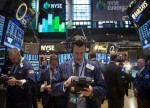
- All Instrument Types
- Indices
- Equities
- ETFs
- Funds
- Commodities
- Currencies
- Crypto
- Bonds
- Certificates
Please try another search

Since the beginning of this economic cycle (2003), traders have always used the Euro-Pound correlation for reassurance when trading one of them against the USD. Due to recent economic situations, traders are starting to question whether that reliability is beginning to loose its strength.
Do correlations between currencies deteriorate towards peeks of economic cycles or do currencies act consistently during economic slowdowns as well?
Last week the Pound experienced one of its worst weeks in a long time. Trading within a range of approximately 800 pips, the Pound experienced a major sell-off due to signals from the BOE that a rate cut could be seen by next year, to prevent an economic slowdown without boosting inflation.
Bond prices have been pricing in a future rate cut for some time now, therefore the central banks hints only triggered off the selling, which led to losses that exceeded the first week of Augusts’ selloff.
Even though the U.S has been taking center stage in the media due to the dire situation of the subprime and financial crisis, it doesn’t mean that the other economies are healthy, especially when analysts are estimating that the housing sector in the UK is now very similar to the sub-prime situation that started in the U.S about two years ago. Over the last couple of years, house prices in Britain have increased so extensively, that new homeowners are finding it hard to begin their lives taking mortgages on high interest, since monthly payments are eating up a large percentage of their salaries. In addition, Global situations are taking its toll on the UK’s economy, especially when commodity prices are sky high, financial lending institutions are collapsing and the fear of a housing
bubble are affecting consumer confidence (Analysts are already estimating zero housing growth in 2008 due to a slowing economy).
To date, the Bank of England’s policy is “let’s wait and see”. Even though inflation continues to remain 0.1% over the bank’s yearly comfort zone, the economy is continuing to grow at a pace of 3.3% yearly, backing up the BOE’s hawkish decision while insinuating that one rate cut might be enough to control the economy. In addition to the problems, Britain’s economy currently derives on imports; the central bank has to take its monetary decisions with extreme caution as a lower pound could encourage its exports, driving inflation up further due to a higher employment rate.
Crossing the English Channel, one can see a slightly different picture; Europe continues to show strong economic growth with subdued inflation justifying the need for a possible rate hike in 2008. In addition, recent speeches from Trichet are only strengthening trader’s expectations that the ECB is not going to reduce rates, but rather take additional monetary policy raising the Fund rate by a possible 0.25%.
From a technical point of view, the pound has just recently bounced off its upper trend line and in a short period of time, retraced over half of its secondary trend up. Taking a glance at the Euro, one can see that despite the recent sell-off in the pound, the Euro remains strong holding its current levels of around 1.4647. As current Bond prices are still showing future economic growth in Europe, traders remain optimistic that growth will be matched by monetary policies. The current lack of correlation can also be seen on the EUR/GBP weekly chart, as it has just broken two strong resistance levels in one week of trading, showing the difference between the recent strength of the two currencies.
Despite the pound’s bad situation, it still remains trading within its major trend and while the economic situation in the U.S is worsening from day to day, all it needs is some more bad news from overseas to have money flowing back, strengthening it up for another short rally.





